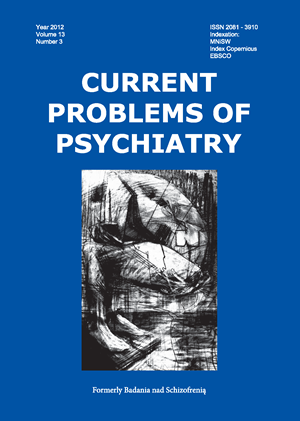Percepcja czasu przez osoby zdrowe i chore na schizofrenię
Keywords:
time perception, schizophrenia, time orientationAbstract
Aim. Comparison the time perspective between the group of healthy people (N=30) and the people with schizophrenia (N=30). Investigations showed, that both of groups are different in the way of experiencing the time. The aim of distinguishing the way of perception of time, is to improve quality of life and psychosocial functioning in patients with schizophrenia.
Method. The method used in investigations was Temporal Orientation Questionnaire AION-2000 devised by C.S. Nosal and B. Bajcar (2004), as well as socio-demographic surveys, different for clinical group (people with schizophrenia) and supervisory group (healthy people).
Results. The analysis of results from the investigation showed, that there are differences in perception of time between group of clinical patients and supervisory group, healthy people are more concentrating on past, then people with schizophrenia, which are more focused on destructivity and non-controlling the time.
Conclusions. People with schizophrenia have difficulties in making reflections and analysis of the past. Healthy people perceive future as positive, in contrast to people with schizophrenia, who not only have problems with creating plans, but also often feel that time is destructive and non-controled.
References
1. Densen E. (1977). Time perception and schizophrenia. Perceptual and Motor Skills. 44 (2), 436-438.
2. Elvevag B., McCormack T., Gilbert A., Brown G. D. A., Weinberger D.R., Goldberg T. E. (2003). Duration judgments in patients with schizophrenia. Pscyhological Medicine, 33 (7), 1249-1261.
3. Kępiński A. (1972). Schizofrenia. Warszawa: Państwowy Zakład Wydawnictw Lekarskich.
4. Nosal C., Bajcar B. (2004). Czas psychologiczny: wymiary, struktura, konsekwencje. Warszawa: Instytut Psychologii PAN.
5. Obrębska M., Nowak A. (2010). Perspektywa czasowa w schizofrenii. Doniesienie z badań. Current Problems of Psychiatry, 11 (4), 323-327.
6. Rammsayer T. H., (1999). Neuropharmacological evidence for different timin mechanisms in humans. The Quarterly Journal of Experimental Psychology Section. B, 52 (3), 273-286.
7. Sobol-Kwapińska M., Nosal C. (2009). How does one conceive time? Measurement by means of Time Metaphors Questionnaire. Polish Psychological Bulletin, vol. 40 (3), 1-7.
8. Stevens M., Crow T.J., Bowman M. J., Coles E.C. (1978). Age disorientation in schizophrenia: A constant prevalence of 25 per cent in chronic mental hospital population. British Journal of Psychiatry, (133), 130-136.
9. Termińska K. (1995). Fenomenologia zaburzeń czasu w schizofrenii. IV LSN 1995, str 161-164, Źródło: http://www.badanianadschizofrenia.org/index.php?get=page, 345,198, Pobrano dnia: 07.10.2011.
10. Tysk L. (1983). Time estimation by healthy subjects and schizophrenic patients: a methodological study. Perceptual and Motor Skills, 56 (3), 983-988.
11. Zimbardo P., Boyd J. (2009). Paradoks czasu. Warszawa: Wydawnictwo Naukowe PWN.


